Known as Ajitsuke Tamago or Ajitama in Japanese, Ramen Eggs are delicious as a topping on ramen or enjoyed as a snack. Learn to make these flavorful, perfect soft-boiled eggs with just five ingredients!
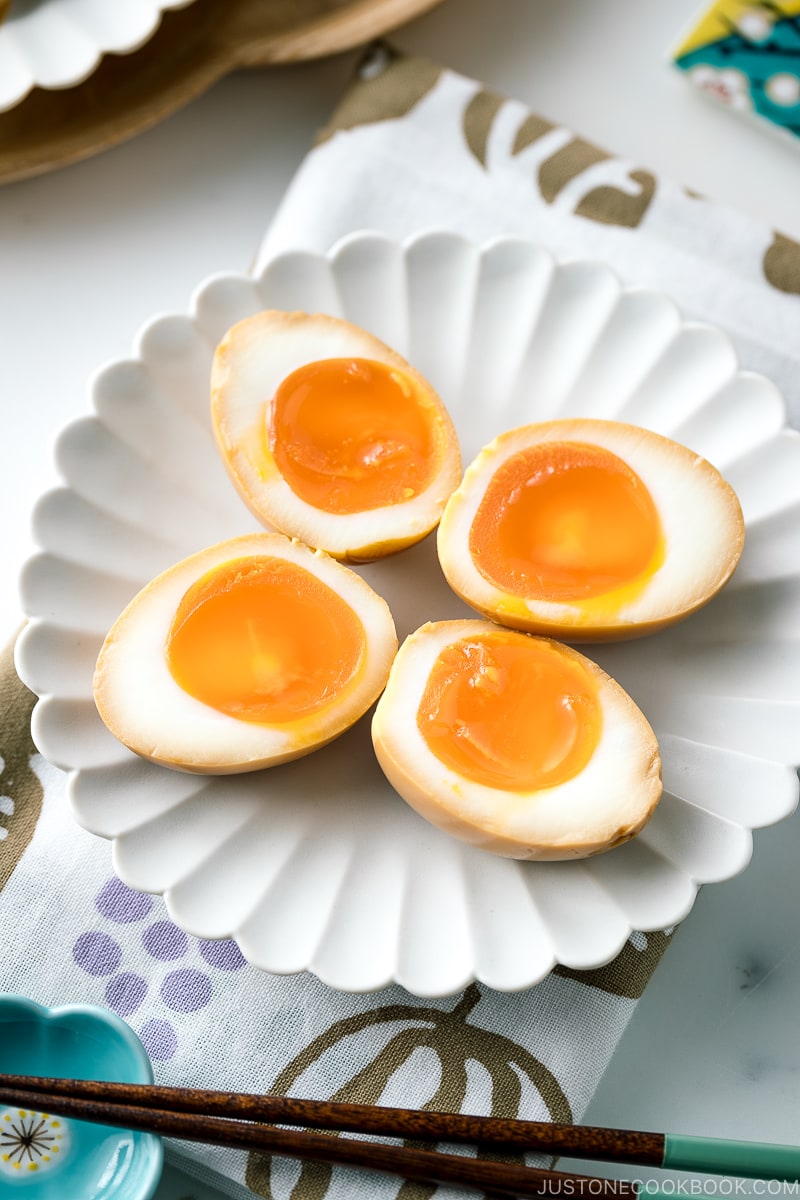
A great bowl of ramen is built upon a few significant components. There’s hot broth, fresh-made noodles, and the toppings. As far as the toppings go, no one can resist a perfectly cooked ramen egg that sits alongside sliced chashu, a sheet of nori, and green onions. Some would even argue that ramen egg is a must!
When done right, ramen egg is creamy, silky, full of umami, and ready to enrich and intensify your ramen enjoyment. The truth is, ramen eggs are not just for ramen alone. You can enjoy these delicious eggs anytime, in many different ways!
Table of Contents
What Are Ramen Eggs?
Ramen eggs are Japanese soft-boiled eggs known for their custardy, jammy, runny yolk, and umami flavor. They are marinated overnight in a sweetened soy-based sauce. In Japan, we call these marinated eggs Ajitsuke Tamago (味付け玉子), short for Ajitama (味玉) or Nitamago (煮玉子).
While these eggs are excellent on ramen, they are also fantastic to enjoy as a side dish, snack, or packed in a bento. Don’t limit yourself there! You can even add them to salads or sandwiches. That’s the magic of ramen eggs. They are so good and amazingly versatile.
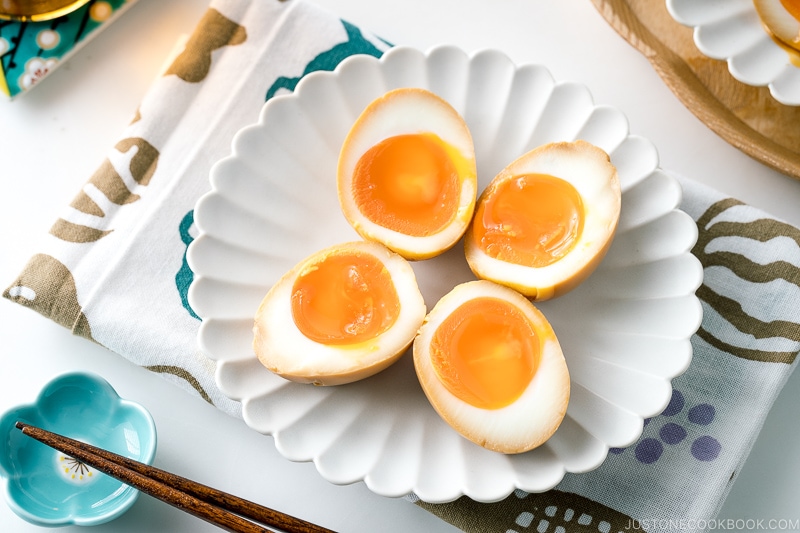
Ingredients for Ajituske Tamago
Five ingredients are all you need, and you’ll be surprised at how easy it is to make ramen eggs at home.
- Good quality eggs, especially if you plan to make soft-boiled eggs
- Soy sauce
- Mirin
- Sake (or water)
- Sugar
For the marinade, you can create your version with additions (such as chili flakes for spice, etc), but let’s stick with the basics.
What changed from the 2011 Recipe?
Some of you might be familiar with the original recipe I shared in 2011. In the past, I used water instead of sake. However, for food safety reasons, I started making my ramen eggs with sake and like this version much better.
Why sake? The amino acids in the fermented rice wine enhance food flavors by adding hints of sweetness and umami, which makes the eggs taste better. In case you’re wondering, we would boil off the alcohol from the sake before marinating the eggs so it’s perfectly safe for kids to consume.
As part of the refinement, I also added a bit of sugar. To put the old and new recipes to the test, I had my family try out the two versions multiple times, and they concluded that the winner goes to this updated recipe. For those who can’t consume alcohol, you can still use water.
How to Make Best Ramen Eggs
You can find the detailed recipe below, but here’s a quick overview.
Jump to Recipe- Make the marinade.
- Cook soft-boiled eggs.
- Marinate the eggs overnight.
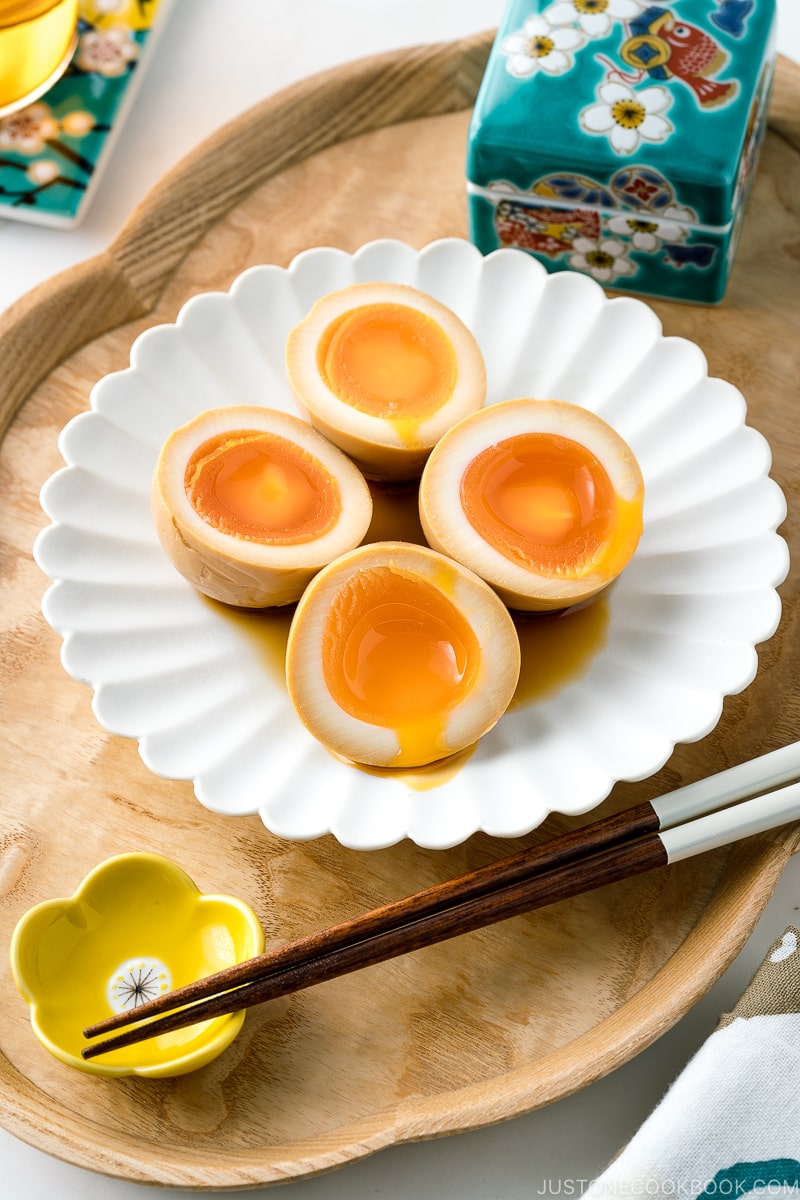
Cooking Tips
Tip #1: Cook the marinade
To make the marinade, I highly recommend cooking it for 1 minute after boiling. This ensures the sugar dissolves and the alcohol evaporates, leaving only the natural umami and sweetness in the sauce.
Tip #2: Use refrigerated eggs
Using a fine-mesh sieve/strainer, gently lower your eggs straight from the fridge into the (already) boiling water and lower the heat slightly to a simmer.
Tip #3: Cook 7 minutes from the first egg in boiling water
Start setting the timer for 7 minutes from the first egg submerged in boiling water. It takes about 30 seconds or less to submerge all four eggs (set the timer for 6 minutes and 30 seconds if you start the timer when you finish submerging all the eggs. Little adjustment matters!)
I use large American eggs for this recipe, and knowing that egg sizes vary in different parts of the world, you might need to adjust the cooking time slightly.
Tip #4: Shock the eggs in ice water
Shock the boiled eggs in ice water immediately and let them chill for at least 15 minutes. I use the same ice water to dip the boiled eggs a few times when peeling them. Water goes into the gap and helps peel easily.
Tip #5: Marinate the eggs overnight
Marinate the ramen eggs for just a few hours or overnight. I can make ramen the next day while the eggs stay marinated in the fridge, waiting for their appearance.
How to Store Ramen Eggs
Soft-boiled eggs should be consumed in 3-4 days. Keep the Ajitsuke Tamago or ramen eggs in the refrigerator at all times. Use a clean utensil to take out a marinated egg, if you continue to marinate the rest of the eggs. I’d take out the ramen eggs after soaking them overnight as I don’t want my eggs to be too salty. You can marinate for up to 2 days at most, but I recommend removing from the marinade after that.
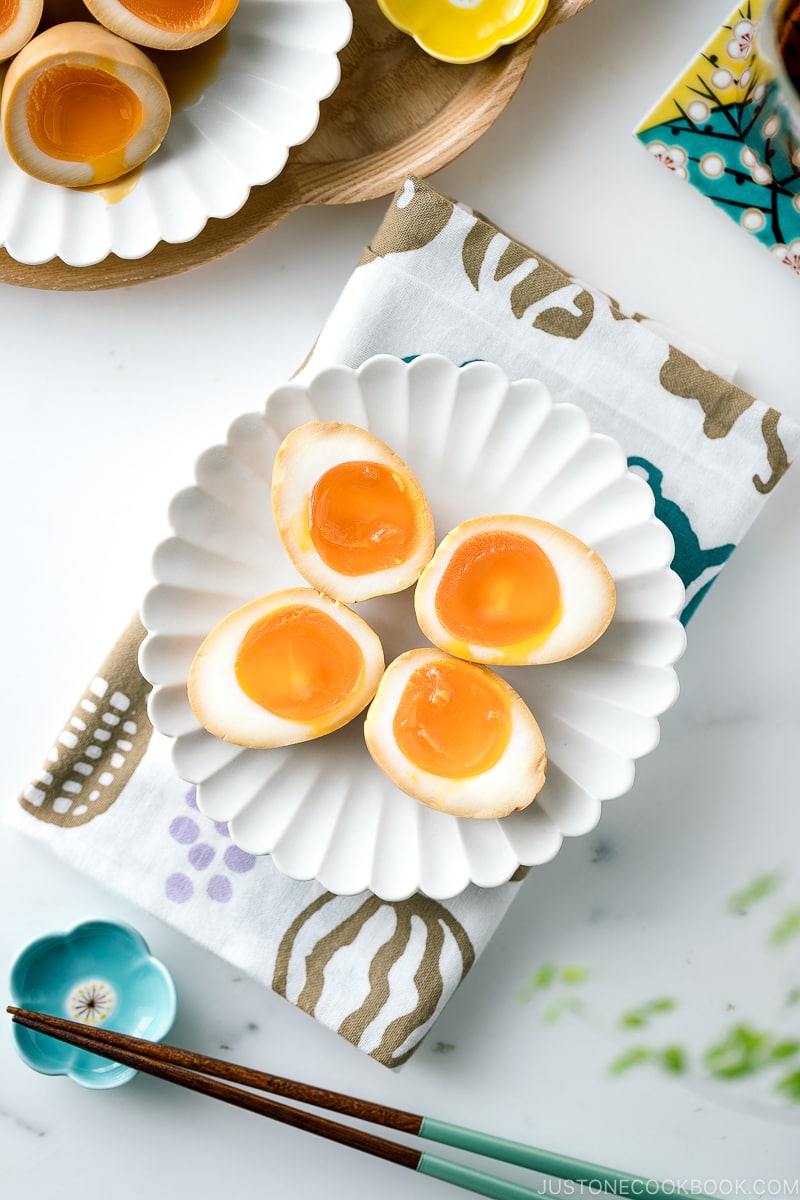
How to Serve
I hope you’ll try this recipe because it can make your day better. Here are my absolute favorite ways to enjoy the eggs.
- Serve with Miso Ramen
- Serve with Vegetarian Ramen
- Serve with Tsukemen (Dipipng Ramen Noodles)
- Serve on Avocado Toast
- Serve with Japanese Curry
- Pack in Bento Box
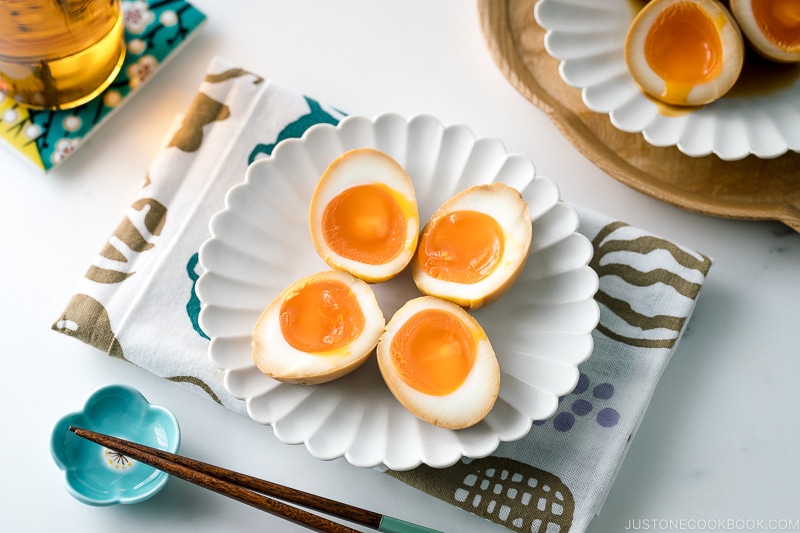
Wish to learn more about Japanese cooking? Sign up for our free newsletter to receive cooking tips & recipe updates! And stay in touch with me on Facebook, Pinterest, YouTube, and Instagram.

Ramen Eggs (Ajitsuke Tamago)
Video
Ingredients
- 4 large eggs (50 g each w/o shell) (refrigerated; use slightly older eggs, which are easier to peel)
Instructions
- Before You Start: Please note that this recipe requires a marination time of 8 hours or overnight. Gather all the ingredients.

To Make the Marinade
- In a small saucepan, combine all the ingredients for the marinade: ¼ cup soy sauce, ¼ cup mirin, ¼ cup sake, and 1 tsp sugar.

- Bring it to a boil and whisk it a few times to let the sugar dissolve completely. Once boiling, lower the heat and simmer for 1 minute. Turn off the heat. Set aside to cool completely.

To Make the Soft-Boiled Eggs
- Add 4 cups (1L) water (for 4 eggs) to a medium saucepan and bring it to a boil. There should be enough water to cover the eggs by at least 1 inch (2.5 cm). Once at a full boil, take out 4 large eggs (50 g each w/o shell) from the refrigerator. Carefully and gently lower one egg at a time into the boiling water with a mesh strainer/skimmer or a ladle. When you add the first egg, set a 7-minute timer. You can cook them 6 to 6½ minutes for a runny egg yolk and 8 to 9 minutes for a custard-like egg yolk.

- Once all the eggs are in the saucepan, lower the heat to maintain a gentle boil. Make sure the water is simmering, but not bubbling so strong that the eggs bounce around. If you want your egg yolks to be centered, gently rotate the eggs with chopsticks once in a while for the first 3 minutes.

- After 7 minutes, immediately take out the eggs and shock them in iced water for 15 minutes.

- Once the eggs are completely cool, gently crack the shell at the wide bottom end of the egg and start peeling it vertically toward the pointy top. Dip the egg in the iced water a few times to help with the peeling. Once you peel one section vertically, the rest of the shell comes off easily.

To Marinate the Eggs
- Place the eggs in a plastic bag and add the marinade to the bag. Why am I recommending a plastic bag? With a plastic bag, we don‘t have to use a lot of marinade to submerge the eggs. This marinade is used only one time for food safety reasons, so it’s most economical to prepare no more than the amount you need. If you use a container instead of a bag, it requires more marinade to submerge the eggs.

- Remove the air from the bag and use a clip or rubber band to seal the bag right above the eggs. This way, the eggs are completely submerged in the marinade. Refrigerate for 8 hours or overnight. You can rotate the eggs occasionally if you like.

To Serve
- Remove the eggs from the marinade and cut them in half lengthwise to serve. Use a piece of string, fishing line, or cheese cutter (that‘s what I used here) to cut the eggs in half cleanly. Enjoy the Ramen Eggs in bento, as a ramen topping, or as a snack sliced in half and sprinkled with furikake (rice seasonings) and shichimi togarashi (Japanese seven spice). If you want to warm up the eggs, soak the bag in warm water to bring up the temperature faster.

To Store
- Keep the Ramen Eggs refrigerated at all times. Do not freeze as the texture of eggs changes when frozen (with the exception of tamagoyaki). The ramen eggs will get saltier the longer they marinate, so take them out from the marinade after 12–24 hours (depending on your preference). Enjoy the ramen eggs within 3–4 days if your eggs are soft-boiled. If your eggs are hard-boiled, you can keep them in the refrigerator for up to a week. For food safety reasons, I do not recommend reusing this marinade with new boiled eggs. You can repurpose this marinade as a seasoning sauce for your stir-fried or simmered dishes but use it soon.
Notes
Nutrition
Editor’s Note: This post was originally published on September 14, 2014. It has been updated with new images, video, and blog content in September 2021.
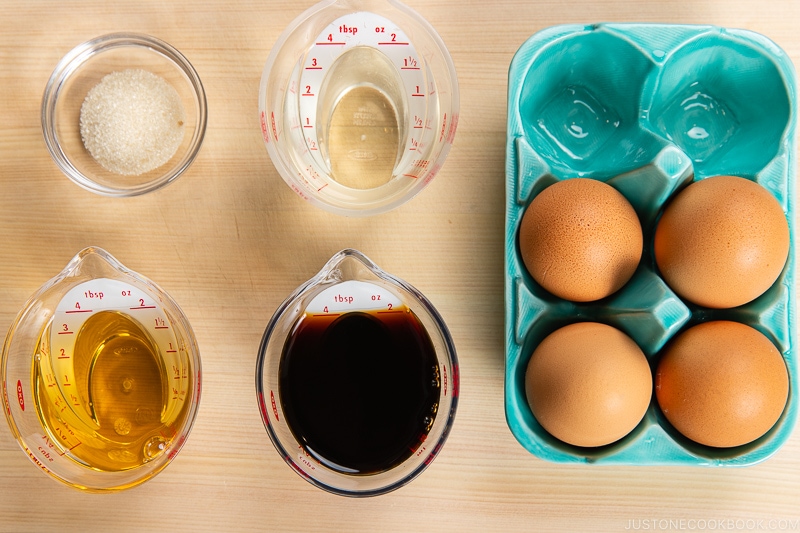
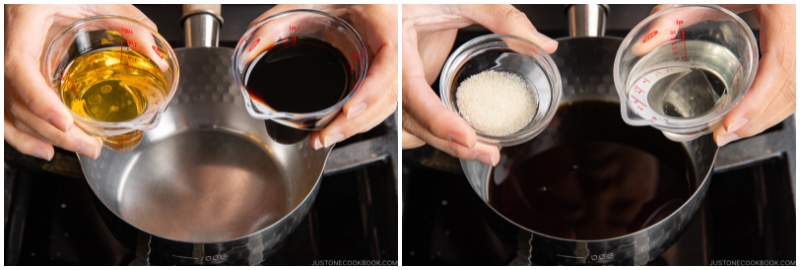
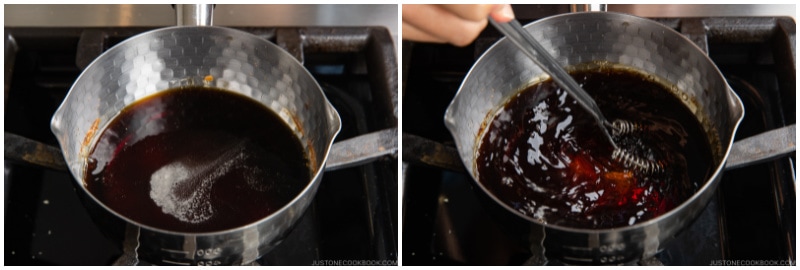
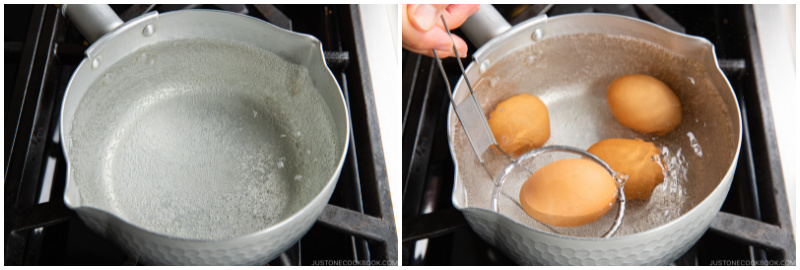
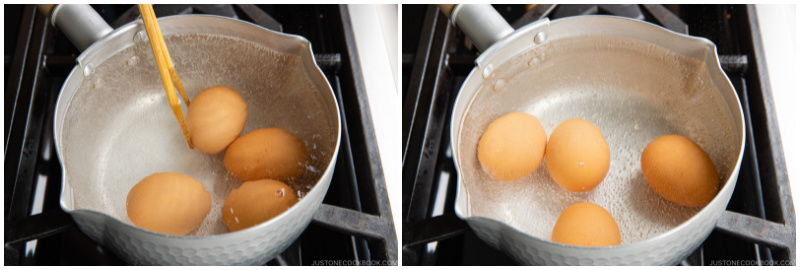
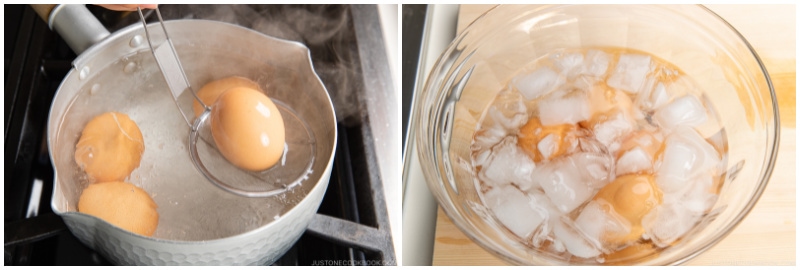
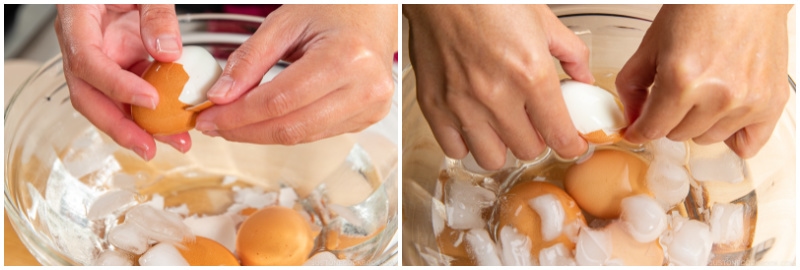
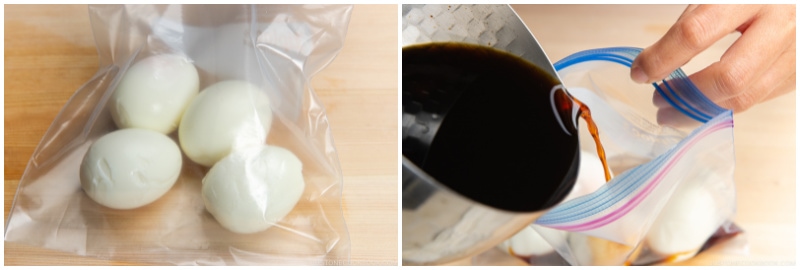
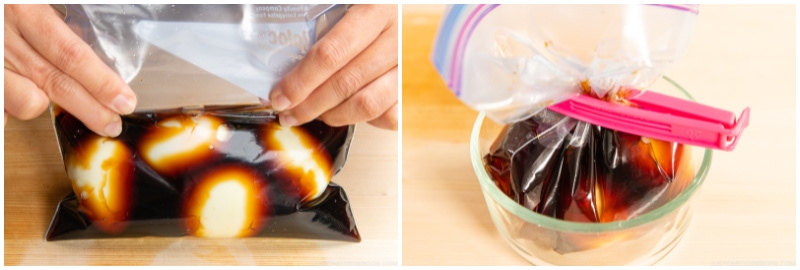
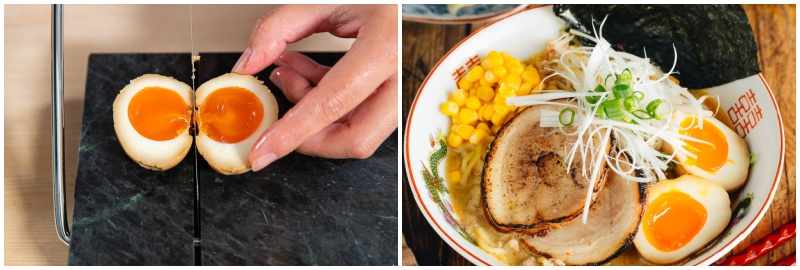

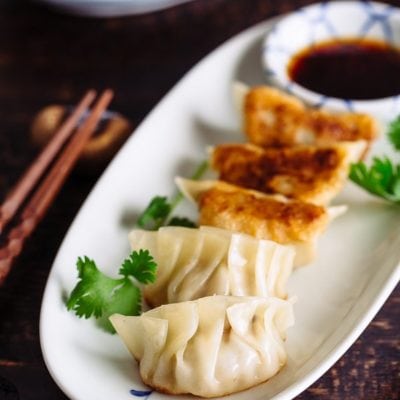



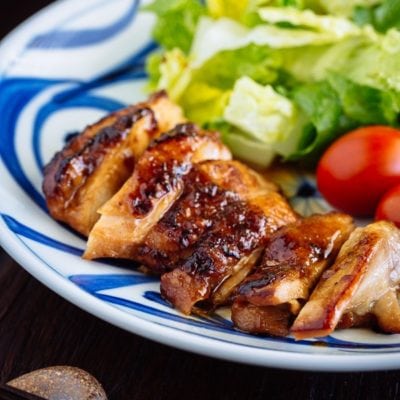


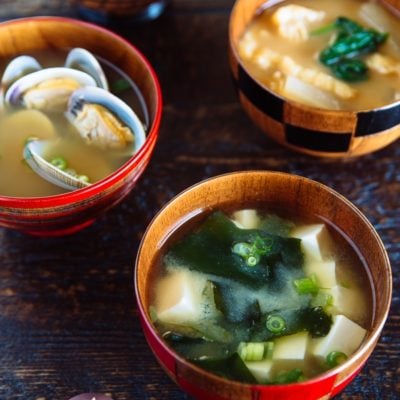



I have yet to make Ramen from scratch but have had it in a restaurant once. I wasn’t impressed with the egg. It wasn’t marinated as yours. I think this will be more interesting.I haven’t decided on broth yet but have ingredients for scratch dash.
Hi Barbara! Ramen shops in Japan offer both non-seasoned version (like you had) and seasoned version (this recipe). I also believe that this seasoned version is tastier. 🙂 I hope you enjoy making ramen at home! My ramen recipes are simple and easy but using the right ingredients is important as it’s a quick recipe and relies on those ingredients.
[…] Adapted from Just One Cook Book […]
[…] few different ways here. I’m partial to soft-boiled eggs for ramen. You can use them as-is or marinate in soy sauce and mirin for a special treat. Hard-boiled and poached eggs are great too. Slow-poached eggs (another Chang […]
Hi Allan! That never happened to me… You are not dropping the eggs to the boiling water right? Do you slowly submerge the eggs with a ladle and release them?
[…] tip: Serve the Miso Meat Sauce with a fried egg, soft-boiled egg, Onsen Tamago, or Ramen Egg (Ajitsuke Tamago). Everything tastes better with a creamy egg! For extra color and crunch, serve with julienned […]
Much easier than I thought it’d be…and so oishii!! Will definitely make again.
Thank you so much for trying this recipe, Mari! I’m glad you enjoyed it! Thank you for your kind feedback. 🙂
Hi !
Just a little message to thank you for that recipe. My son is eating tons of eggs as a bonus proteins for muscular training and was getting tired of it. And guess what, he loves those and it’s gonna be a while before he get tired of it ! An easy, quick way to have a twist on eggs loaded of flavours. Now it’s time to stop being afraid to do ramen, I’m sure your recipes will give me confidence ! Thanks again and keep on that awesome website. Morgane.
[…] Soft boil a few eggs, plunge them into an ice bath, and carefully peel away the shell. Marinate them overnight in the fridge and the next day you’ll have ramen eggs! […]
Hi Beck! Thank you for trying this recipe! I’m so glad you enjoyed it and thanks for your kind feedback. 🙂
[…] 5. Ramen Egg […]
Can I use my foodsaver to marinate the soft boiled eggs and store them too? I borrowed a foodsaver from a friend to try it out and learning what things I can use it for
[…] broth – a local favourite. Couple this with any of their plethora of ingredients – from their ajitsuke tamago (soft-boiled egg) to their fish cakes and chicken balls – and there you have yourself a […]
[…] Ajitsuke Tamago (Ramen Egg) […]
[…] https://www.justonecookbook.com/ramen-egg/ […]
Love these! The first time I made the them I tried one the next day and found the egg to be undercooked and not very flavorful. Day two was better, but by day three they were PERFECT! I don’t totally understand how marinating them makes them cook through more, but it is the perfect amount of flavor and consistency! Now I get why they’re only cooked 7 minutes. Just made a second batch, it’s going to be a long three day wait ^.^ My mom is Japanese and I’ve spent a lot of time growing up in Japan, so these really hit the spot.
Hi Heidi! I’m so glad to hear you figured out how to make the perfect ramen egg. I think the saltiness from the sauce changes the texture of the egg, not necessarily “cook”. You can also play with the amount of water if you want to speed up the process. Thank you so much again for your feedback!